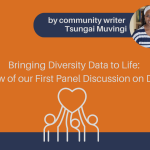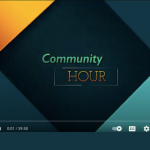
Hello dear readers, friends, and CMCCF allies!
In many ways, March is a milestone month; made famous not only by International Women’s Day (March 8), but also the International Day for the Elimination of Racism (March 21).
On a personal note, the phrase “beware the ides of March” (March 15), has always been part of my consciousness in relation to this particular month, as a kind of red flag that signals danger lurking in the shadows! (There was a time several years ago that the onset of March would lead me to feel superstitious and anxious!) The back story of this phrase though, for those not familiar with it, goes like this: supposedly it was a soothsayer’s warning to the Roman leader, Julius Caesar, in William Shakespeare’s famous tragedy-with the same name (published in 1623). The same happened in real life too, and this phrase is an alert to Caesar to be vigilant on March 15 as some harm may come to him. And the soothsayer was indeed right as this is the exact day of the assassination of Julius Caesar, carried out by members of the Roman Senate who feared he was becoming too powerful.
I wonder sometimes if it’s a good thing or not, that certain days become signifiers for this or that memorable event or individual, be it for good or for evil; and they remain then forever etched so in our psyches, based on that association. And maybe in a grand gesture, but also equally in a tokenistic manner, we mark these days by allotting them special status. This could be true of International Women’s Day when individual women-mothers and wives, sisters and daughters- are showered with gifts on March 8; women’s achievements are highlighted; and oftentimes new policy initiatives for their welfare or development may be kicked off on this date.
What may be problematic though in an entire species- women- being celebrated on the one single day only in the entire year, is if no sustainable change is experienced by them in their lived realities during the rest of the 364 days remaining in the year: be it in terms of their economic status, like having pay parity with men; or in their social conditions and legal rights, like, when acts of sexual and domestic violence are perpetrated against them; or overall, when women are not able to access the range of opportunities (that men easily do) that can help them realize their full potential.
Speaking of March 21, let me share some history, and the inspiring back story too. March 21 is observed annually as the International Day for the Elimination of Racial Discrimination; it was on this same day in 1960 that during a peaceful demonstration to protest apartheid “pass laws,” in Sharpeville, in South Arica, the police opened fire and killed 69 people. Following this, in 1979, based on a decision by the UN General Assembly, a week of solidarity starting on March 21, was instituted so that people from diverse communities could come together to support each other as a way to combat racism and discrimination, and join forces to fight racial injustice together.
Fast forward to 2022, with the theme for this special day being “Voices for Action Against Racism.” In this edition, the focus is on strengthening public participation and representation in decision-making circles so it becomes possible for people to have their voices heard in a safe environment, affirming their right to peaceful assembly, and civic space without fear of punishment or reprisal. The above story highlights that both grassroots action and policy initiatives are perhaps equally important, but it is also important for us as individuals to take ownership of our everyday actions, and to understand how big and impactful our own small role may be. And this may also help us commit to continue pushing for change using all possible (and impossible) means. So, what might “doing something” look like? Ensuring that we are not silent bystanders is important; and it may simply be about calling out a racist act or a slur when we witness it; going by the moral principle that underpins the well-known adage- “if you see something, say something” is important.
Organizations play a big role too, not just in moving the needle on social change but they can also be instrumental in scaling transformation in society. For instance, at CMCCF, our objective is to advocate for J.E.D.I -be it through the community engagement events we host or the panel discussions we organize; or the training program we recently completed to help empower young community leaders, called “cultural community engagement through dialogue”; or through our storytelling project and our social media presence.
These learning events and activities are all geared towards the same purposes. One of these is to help bring visibility to the ugly face of racism and inequity, discrimination and xenophobia, in our everyday lives, be it in the systems within which we live and work, or in the biases that exist in some individuals among whom we live and love, work and play.
In light of the above discussion- about certain days in a year being markers of something important or eventful- a question begins to emerge for me: how can these “days,” like International Women’s Day, or the Day for Elimination of Racism and Discrimination be made more substantive, more action-oriented, instead of just being vehicles for “appropriate” messaging; or full of celebrations that end up being largely performative and expensive?
In their current usage, do these days-marked special-even theoretically, carry the lofty goal of eliminating racism forever from the face of the planet? Is that the dream and the goalpost, or is it just about reminding ourselves once every year that sadly and painfully, racism is still very much with us, and will always be entrenched so?
Courage, inspiration, and hope for a better future may come to us from anywhere, including from the past, through stories of role models who have walked before us; and for this reason, we must go out of our way to celebrate these heroes on special days- the brave women and men who have already changed our world by their actions, their advocacy, and their activism.
However, realizing that the work aimed to effect social and transformative change is ongoing and never-ending is important; as is believing in it, and owning personal responsibility to contribute to it, with our sweat and tears, and through our actions. It’s also about searching for and finding hope, and then making sure to keep it alive. Without hope (and hard work), we have nothing.
Stay hopeful then, and let’s keep working hard to imagine that better world so we may all contribute towards creating it….

The views expressed in this blog post are mine, and I take full responsibility for them. We are always wanting to hear from you – please share your thoughts and feedback by completing our contact form here or by emailing hello@cmccfamilies.ca.
To learn more about our Intercultural and Intergenerational Diversity and Inclusion Engagement Project, go to our J.E.D.I. Initiative landing page here.

 Previous Post
Previous Post Next Post
Next Post